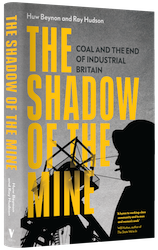LEWIS MATES reviews a new book that charts the decline of former mining communities in Durham and south Wales, and explores the political and cultural consequences of their demise.
The centenary of the Labour Party first taking control of Durham County Council came in 2019, the year that also saw the collapse of the party’s so-called ‘red wall’ seats in that year’s general election. The election produced a similarly disconcerting spectacle in south Wales, where Labour’s vote share dropped. It lost six seats in Wales overall.
 The Shadow of the Mine, by Ray Hudson and Huw Beynon, deploys the authors’ collective expertise to consider how and why these former coalfield areas moved from the centre of British politics and industry to its periphery after 1918, and the long-term consequences for Labour and the country. In doing so, it offers an historical grounding for the startling political developments of recent years.
The Shadow of the Mine, by Ray Hudson and Huw Beynon, deploys the authors’ collective expertise to consider how and why these former coalfield areas moved from the centre of British politics and industry to its periphery after 1918, and the long-term consequences for Labour and the country. In doing so, it offers an historical grounding for the startling political developments of recent years.
Chapter one contextualises the two coalfields, offering a comparative overview of their socio-political complexions before 1945. While the South Wales Miners’ Federation was much younger than the Durham Miners’ Association, both served exporting coalfields.
At the time of ‘peak coal’ in 1913 they were the two largest affiliates of the Miners’ Federation of Great Britain (MFGB) and therefore key players in Labour movement and national politics. The two coalfields intertwined culturally and politically too, as the influence, for example, of south Wales syndicalists on their Durham counterparts testifies.
The following four chapters move from coal nationalisation in 1947, through the Wilson and Heath years, and the consequences of the power loading agreement of 1966, to Thatcher and the 1984/85 miners’ strike.
The remaining 10 chapters adopt a part-chronological, part-thematic approach to what happened in the bitter aftermath of the strike and privatisation of the shrunken British coal industry in the 1990s. That brings us to Brexit and the Labour’s catastrophic 2019 defeat.
The authors point convincingly to New Labour’s fetishising of markets, its abdication to the apparently insuperable powers of globalisation, its worship of financial institutions, and its neglect of the working-class vote in its now former post-industrial heartlands. They implicate Blair, Brown and all their apparatchiks heavily in the events of 2016 and 2019.
Alienation and neglect
Earlier policies and politicians were also culpable, however. Hudson and Beynon suggest that nationalisation was responsible for the degradation of the coal mining industry and its communities, while earlier Labour administrations also deserve their share of blame. The leadership of the early post-war National Union of Mineworkers was also guilty, not least when it colluded with the National Coal Board to suppress miners’ compensation cases.
There is an underlying assumption in The Shadow of the Mine that alienation and neglect in these former mining communities led to them voting for Brexit and then to the loss of red wall seats.
 But they might have explored rather more the complexity of recent political responses and identities. For example, the quotes from former coal miners and their families that enrich the text appear to have been mostly conducted during the New Labour period, so we do not hear from a whole generation of younger people growing up in former coalfield areas.
But they might have explored rather more the complexity of recent political responses and identities. For example, the quotes from former coal miners and their families that enrich the text appear to have been mostly conducted during the New Labour period, so we do not hear from a whole generation of younger people growing up in former coalfield areas.
The book also leaves open the question of what remains of a community’s spirit after coal mining ends. The Covid crisis undoubtedly worsened poverty and inequality, but it also spawned the spontaneous emergence of neighbourhood mutual aid support groups all over the country, suggesting that in some places a remarkable and powerful sense of solidarity and resilience remains.
Of course, none of this is to deny that former coal mining areas find themselves in seriously straitened circumstances that are likely to worsen with the cost of living crisis, nor that the trade union movement is shackled by the most restrictive laws in western Europe, and we have a government that is corrupt and out of touch.
The Shadow of the Mine reminds us that Brexit and the subsequent struggles of the Labour Party and its movement was long in the making. We need to adopt a long view to appreciate the transformation of working-class identities and interests, the complexities of contemporary British politics more generally, and where organised labour could go next.
Some will disagree with the authors about where former coal communities now find themselves, and why, and about their future prospects. But The Shadow of the Mine asks important questions, and invites us to develop historically informed answers.
—-
Lewis Mates is associate professor in political theory at Durham University.
The Shadow of the Mine: Coal and the End of Industrial Britain, by Ray Hudson and Huw Beynon was published by Verso in 2021, and available here for £12.



29 August 2022
There’s a selective analysis here.